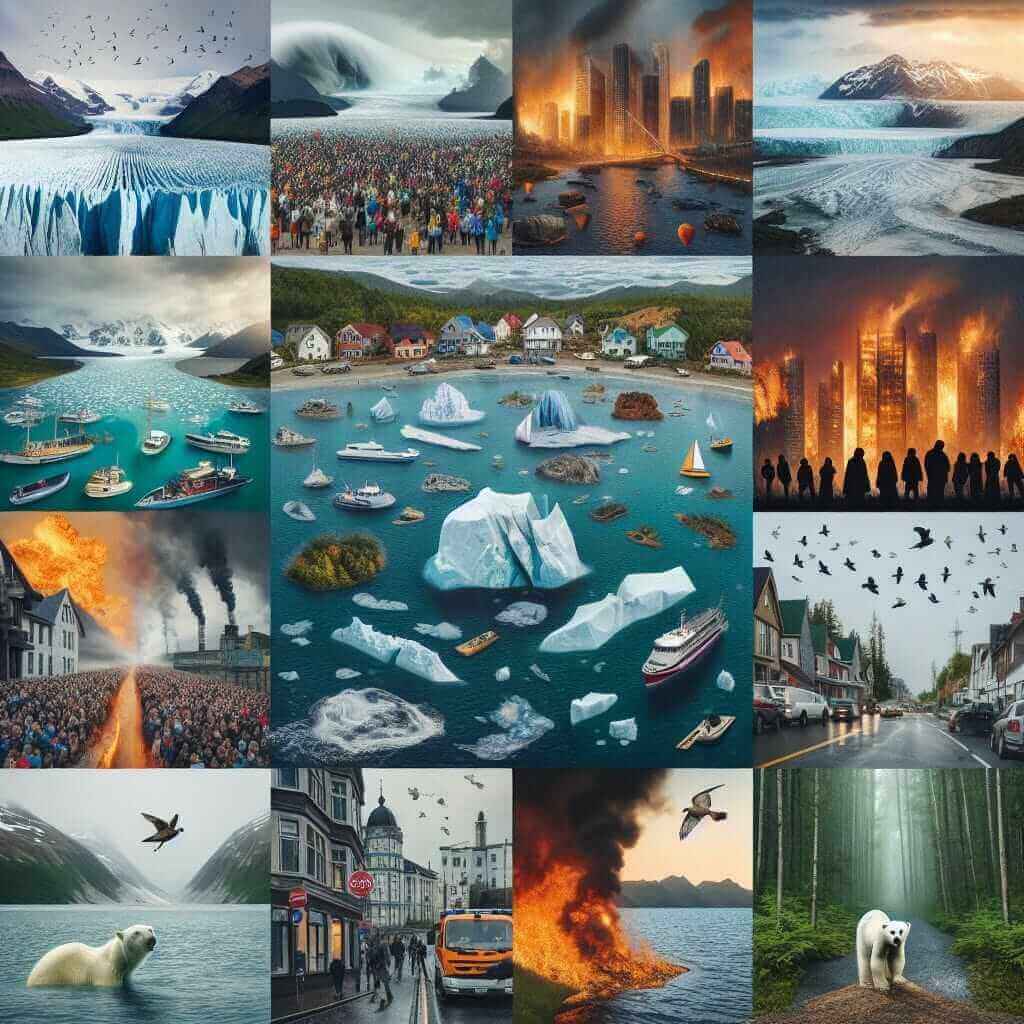The link between climate change and natural disasters is undeniable, making it a hot topic in IELTS Writing Task 2. This essay will delve into the impact of climate change on the frequency and intensity of these events. We’ll analyze a sample question, provide a model answer, and offer valuable vocabulary and writing tips to help you achieve a band 8.
Here are some potential IELTS Writing Task 2 questions on this topic:
- To what extent do you agree that climate change is the primary catalyst for the increasing frequency and intensity of natural disasters?
- Discuss the impact of climate change on natural disasters and analyze the effectiveness of potential mitigation strategies.
- Some believe that focusing on climate change adaptation is more crucial than attempting to mitigate its effects. Discuss both views and give your opinion.
Model Essay: Climate Change – The Driving Force Behind Intensified Natural Disasters
Let’s break down the first question: To what extent do you agree that climate change is the primary catalyst for the increasing frequency and intensity of natural disasters?
Analysis
This question requires you to present a balanced argument, acknowledging the role of climate change while considering other contributing factors to natural disasters.
Model Answer
It is an irrefutable truth that our planet is experiencing a period of unprecedented environmental change. While natural disasters are not a new phenomenon, the escalating frequency and ferocity of these events have ignited a global debate about their root causes. This essay posits that although climate change is undoubtedly a significant driver, it is not the sole catalyst for this alarming trend.
The scientific evidence linking climate change to heightened natural disaster risks is compelling. Rising global temperatures, fueled by greenhouse gas emissions, are directly linked to the increased intensity of hurricanes, droughts, and wildfires. For instance, warmer ocean temperatures provide more energy for hurricanes, leading to more destructive storms like the recent Hurricane Ida. Similarly, prolonged periods of drought, exacerbated by rising temperatures and shifting rainfall patterns, create tinderbox conditions that contribute to devastating wildfires like those witnessed in Australia and California.

However, attributing the surge in natural disasters solely to climate change would be a simplification. Human activities, such as deforestation, urbanization, and poor land management practices, also play a crucial role. Deforestation, for example, disrupts natural water cycles, increasing the risk of both floods and droughts. Similarly, the rapid expansion of urban areas into floodplains increases vulnerability to flooding events.
In conclusion, while climate change is undeniably a potent force behind the escalating frequency and intensity of natural disasters, it is not the only contributing factor. Human activities and natural climate variability also play a role. Effectively addressing this multifaceted challenge requires a two-pronged approach: mitigating climate change through reduced emissions and adopting sustainable land management practices to minimize human-induced vulnerabilities. Only by addressing both aspects can we hope to build resilience against the growing threat of natural disasters.
(Word count: 286)
Writing Notes:
- Structure: The essay follows a clear structure: introduction, body paragraphs presenting both sides of the argument, and a conclusion.
- Vocabulary: Use a range of vocabulary related to climate change (e.g., unprecedented, escalating, emissions, mitigation, resilience).
- Grammar: Employ a variety of grammatical structures, including complex sentences and transition words (e.g., however, similarly, in conclusion).
- Evidence: Support your arguments with relevant examples and factual information.
Key Vocabulary:
- Catalyst (noun /ˈkætəlɪst/): A person or thing that precipitates an event.
- Irrefutable (adjective /ɪˈrefjətəbl/): Impossible to deny or disprove.
- Unprecedented (adjective /ʌnˈpresɪdəntid/): Never done or known before.
- Exacerbate (verb /ɪɡˈzæsəbeɪt/): Make (a problem, bad situation, or negative feeling) worse.
- Mitigation (noun /ˌmɪtɪˈɡeɪʃn/): The action of reducing the severity, seriousness, or painfulness of something.
- Resilience (noun /rɪˈzɪljəns/): The capacity to recover quickly from difficulties; toughness.
- Tinderbox (noun /ˈtɪndəbɒks/): A situation or place considered very likely to ignite easily or cause an explosion.
- Vulnerability (noun /ˌvʌlnərəˈbɪləti/): The quality or state of being exposed to the possibility of being attacked or harmed, either physically or emotionally.
- Potent (adjective /ˈpəʊtənt/): Having great power, influence, or effect.
- Multifaceted (adjective /ˌmʌltiˈfæsɪtɪd/): Having many different aspects or features.
Conclusion
Mastering the art of writing a high-scoring IELTS essay on climate change and natural disasters demands a blend of knowledge, vocabulary, and structured writing. By following the tips and analyzing the model essay provided, you can significantly enhance your ability to tackle this crucial topic. Remember, practice makes perfect, so keep writing and refining your skills.
For further practice, consider exploring related themes such as the economic impact of climate change or the role of technology in disaster prediction and prevention.